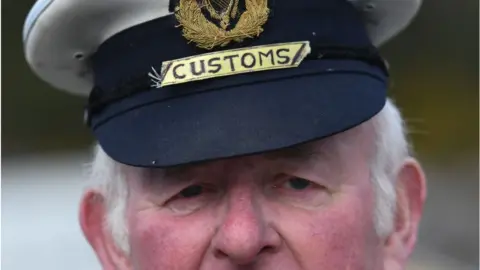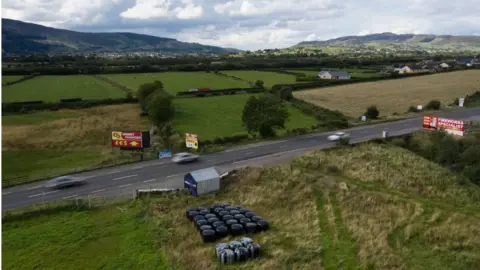Will Northern Irish 'exports' within UK need checks?

 NurPhoto
NurPhotoToday was another day of confusion over the thorny issue of what exactly happens to the currently frictionless, check free trade enjoyed from Northern Ireland to Great Britain, across the Irish Sea.
The PM's withdrawal agreement, agreed with the EU, results in a new requirement for a declaration for all goods leaving Northern Ireland for Great Britain, even though this would be the same country and customs territory.
The government has been adamant that this is not an Irish Sea border check, but different Cabinet ministers described the procedures around this "exit summary declaration" form in different ways today.
Checks or not?
Brexit Secretary Stephen Barclay told the Commons on Northern Ireland to Great Britain: "there will be minimal, targeted interventions, designed to prevent, for example, the trade in endangered species".
But at the same time, the Home Secretary, Priti Patel, in a written statement clarifying testimony to the Home Affairs Committee on Wednesday, wrote: "The UK does not intend to carry out checks… There will be a minimal administrative process."
These two statements are importantly different.
The first suggests that a process of some sort will be carried out by the government. The latter suggests it is merely a form for a haulier or trader to fill in.
The precise nature of these formalities will be worked out by the post-Brexit Joint Committee of the UK and EU, but the government has said it will try to "eliminate this process" as soon as possible after Brexit.
The EU itself has waived the need for these exit summary declarations for its exports with Norway and Switzerland, in separate customs territories, because those nations have coordinated regulatory and security standards.
In this deal, the government has accepted the need, for now, for the same declarations within a single nation, and the same single UK customs territory.
EU officials say that the exit summary declarations, which will exist as the consequence of ongoing EU customs law in Northern Ireland, are required, for example, for VAT reimbursement and "reprocessing" procedures for saving tax on imports of parts, which require proof of departure from the EU.
In addition such declarations are used under EU law to help enforce restrictions and prohibitions such as for animal welfare, and on conflict diamonds.
The government points to the fact that the withdrawal agreement explicitly permits the UK to continue "unfettered market access for goods moving from Northern Ireland to other parts of the UK internal market".
The government says it has no plans to change this. However, it is not prevented from applying some checks, if necessary, in future.
Checks and balances
Economics and trade experts point out that if there are never to be any checks, Irish manufacturing and farm exports would have quota free and tariff free access to the whole UK, regardless of the striking of any free trade deal.
Indeed any goods in the single market, freely exported to the Republic of Ireland, could then find its way into the UK without having been checked.
This could require the need for some form of check in the future. Indeed, Jim Harra, the interim head of the HMRC, on Tuesday told MPs who asked specifically about tracing goods imported from EU via Northern Ireland: "The UK is free to decide for itself the extent to which it wants to control that".
 Dan Kitwood
Dan KitwoodFor now "the only prohibitions and restrictions that will apply on goods moving from Northern Ireland to Great Britain, so west to east, are those that are required to fulfil international obligations".
An impact assessment released alongside the bill acknowledged that "due to data limitations it has not been possible to monetise the associated additional costs to business" in Northern Ireland as a result of these declarations.
Rule alignment
But they don't exist at the moment, did not exist under Theresa May's deal, nor under no-deal, nor even between the EU and some other territories outside its customs union, such as Switzerland and Norway.
In order to negotiate them away, it is highly likely that the EU would insist on a certain degree of customs alignment. They are also subject to the consent of the Northern Ireland Assembly after four years.
And although the government is keen to downplay any checks associated with this electronic declarations, some would be required for example for enforcement against illegal trade in endangered species, and though not currently planned, may conceivably be required in future to prevent Northern Ireland being a backdoor for any product circulating in the EU into the UK.
